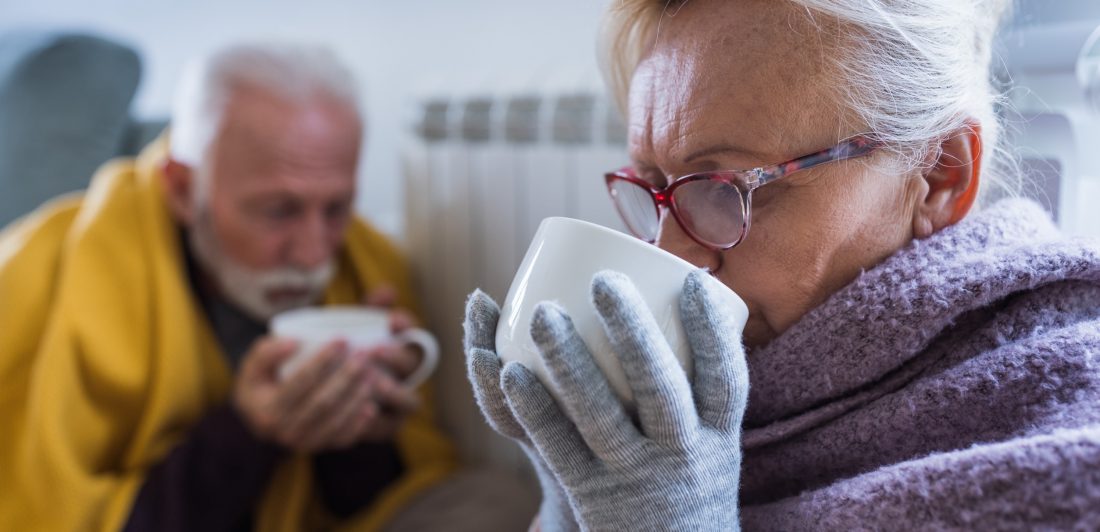Most people who’ve lived in Texas for a few years remember the large winter storm that froze the majority of the state in February 2021. Winter Storm Uri wasn’t the most severe winter storm Texas has ever seen, but it turned catastrophic due to widespread power outages. According to a survey by the University of Houston, 69% of Texans lost power for an average of 42 hours.
With below freezing temperatures and no power, many homes were unbearably cold. While the power grid has been strengthened since Winter Storm Uri, it’s still important to know how to avoid hypothermia and stay safe during winter storms.
What Should I Know About Hypothermia?
It may seem obvious that hypothermia poses one of the greatest safety risks during a winter storm. However, many people, especially Texans who are accustomed to the hot weather, may not fully understand the dangers of hypothermia or who is at risk. Some may not even really know what exactly hypothermia is.
Hypothermia is a medical emergency that occurs when a person’s body loses heat faster than it can produce it. Typically, hypothermia causes internal body temperature to drop dangerously low. While a normal body temperature is 98.6, hypothermia can cause the body temperature to drop below 95. When the body’s internal temperature gets too low, the organs can’t work properly. If it goes untreated, hypothermia can cause the heart and respiratory systems to fail completely.
What are the Signs of Hypothermia?
Hypothermia can be life-threatening. Luckily, there are a few signs and symptoms you can look out for. If you or someone else has been out in the cold weather or water for extended periods of time, watch out for these signs of hypothermia:
- Shivering
- Slurred speech or mumbling
- Slow, shallow breathing
- Weak pulse
- Lack of coordination
- Drowsiness or low energy
- Confusion or memory loss
- Loss of consciousness
- Bright red, cold skin (infants)
Whenever you spot any of these signs of hypothermia, move to a warm place, take off any wet clothes, and get medical attention as soon as possible.
Who’s Most at Risk for Hypothermia?
Although hypothermia is dangerous for everyone, there are a few groups of people who are especially vulnerable. Listed below are some of the most common victims of hypothermia.
- Older adults with inadequate food, clothing, heating, etc. Elderly people without access to essentials such as food, clothing, and heating are more at risk for hypothermia, as the body’s ability to regulate temperature decreases with age. They may also have difficulty moving to warmer places or contacting people for help.
- Babies sleeping in cold places. Infants are also more at risk for hypothermia, especially when they’re sleeping. Parents may not realize that the baby is too cold since they don’t always show symptoms as adults do.
- People outdoors for long periods of time. Being outdoors in the winter without the proper clothing is dangerous, especially if it’s for an extended period of time. Typically, people such as hunters, hikers, and the homeless have increased risks for hypothermia.
- People who drink alcohol or use illicit drugs. Alcohol and illicit drug use increase a person’s chance of hypothermia mostly because it hinders their ability to think and act clearly. A person who is drunk or high may be unable to communicate or move to a warm place, or they may not even realize that they’re too cold.
Other Risk Factors
- Exhaustion: people typically can’t tolerate the cold as well when they’re fatigued.
- Mental disorder: people who struggle with mental disorders may not understand the dangers of hypothermia, and they may wander from safety and get lost.
- Certain medical conditions: some medical conditions, such as diabetes and Parkinson’s disease, affect the body’s ability to regulate temperature.
- Certain medications: some drugs, like antidepressants and antipsychotics, can change the body’s ability to regulate temperature.
Five Ways to Avoid Hypothermia
While many people think hypothermia is only a problem to be worried about if they’re stuck outside, hypothermia can be a real threat even if your house is normally warm and cozy. Winter Storm Uri caused a loss of power for many Texans who were unprepared to face the cold in their own homes. Here are five ways you can avoid hypothermia in a winter storm.
1. Dress in Layers
One of the most common causes of hypothermia is a lack of proper clothing for weather conditions. If you know you will be out in cold weather for long periods of time, make sure to wear layers of warm clothing. Don’t forget about hats, scarves, and gloves. If you’re unsure of how much clothing to wear, put on more than you think you need. It’s better to have it and not need it than need it and not have it!
2. Eat and Drink Regularly
Another way you can avoid hypothermia is to make sure you give your body what it needs to function. Eat balanced meals and drink lots of fluids. In addition to giving you the energy you need to stay warm, consuming hot food and drinks will help you warm up from the inside out.
3. Stay Dry
Another common cause of hypothermia is exposure to cold water. Keeping your skin dry is essential to staying warm in cold weather, so try to avoid getting wet. If you do go for a swim (whether accidentally or on purpose), make sure to change out of wet clothes as soon as possible. This also applies to clothes that may be wet from the rain, snow, and ice.
4. Try to Keep One Room in the House Warm
If for any reason you are unable to keep an entire house warm, a good way to help avoid hypothermia is to try your best to keep one room warm. You can do this by closing off all other rooms and focusing any heat sources into one area. Having one warm room to stay in is essential for a crisis like a winter storm.
5. Ask Doctors about Medical Conditions and Medication
As mentioned earlier, some medical conditions and medications can affect a person’s ability to regulate their body temperature. If you’re concerned about any health issues or medications, be sure to contact your doctor. Knowing about any issues before cold weather hits can help you be more prepared.
Tips to Keep Your House Warm Without Electricity
The widespread loss of power during Winter Storm Uri left many Texans unprepared to face the cold without heaters. In the case that a winter storm knocks out the electricity, you’ll have to take action to keep yourself and your house warm. Here are a few things you can do to avoid hypothermia in a house without electricity.
- Keep windows and doors air-tight
Keeping cold air out of the house is very important if you lose electricity during a winter storm. You can make your windows and doors airtight by using removable window caulk, plastic, or tape. If you don’t have those, you can at least stuff a rag or piece of clothing into any noticeable cracks.
- Put up curtains
Putting up a set of heavy curtains can block drafts coming through windows. It’s also a good idea to open them when the sun is out to allow the sunlight to warm the house, but make sure to close them when the sun isn’t shining.
- Cover the floors
Heat can also escape through the flooring of your house. If your home has hard flooring such as laminate, wood, or tile, try putting rugs, carpet, or even blankets on the floors. Rugs and carpets are generally warmer than hard flooring and will help keep you and your house warm.
- Light candles
For many people nowadays, candles are used for decoration and making your house smell nice. However, candles will help you if your electricity goes out by offering both heat and light. Placing multiple candles in a small area can help heat up a space. Remember to be mindful of fire hazards, though!
- Layer up
This piece of advice may seem obvious, but it’s still helpful. Putting on multiple layers of clothing, including hats, gloves, scarves, and socks will help conserve body heat and prevent heat loss through skin exposure to the cold air. In addition, you can bundle up in blankets for more layers.
- Sleeping bags
Having trouble sleeping in the cold? You might try sleeping in a sleeping bag. Since sleeping bags are designed for outdoor use, they’re often made to keep you warm in colder temperatures.
- Try some exercise
Exercise is a great way to get your internal body temperature up if you’re feeling extra cold. A few minutes of light cardio like jumping jacks, jogging in place, or walking around the room should help you feel a bit warmer. If you have kids, you could try playing some energetic games to get the blood pumping while also having fun!
- Put up a tent or make a fort
Speaking of having fun with kids, what kid doesn’t love building a fort or hanging out in a tent? In addition to being a fun activity, spending time in an enclosed space like a tent or a fort is a great way to keep warm. It’s much easier to keep a small space warm than a big room. Plus, you can turn a potentially scary experience into a fun memory.
The Carlson Law Firm Can Help
A lack of power in the midst of a winter storm can be a serious and scary event. While hypothermia is a real threat in cold weather, there are ways to prevent it. Taking the proper steps to protect yourself and keep your house warm can help you avoid hypothermia.
However, if you or your loved one were injured by someone else’s negligence in a power outage caused by a winter storm, you should consider talking to a personal injury attorney. The Carlson Law Firm has been helping families who’ve lost loved ones hold negligent parties accountable for 45 years. We care, and we can help.





